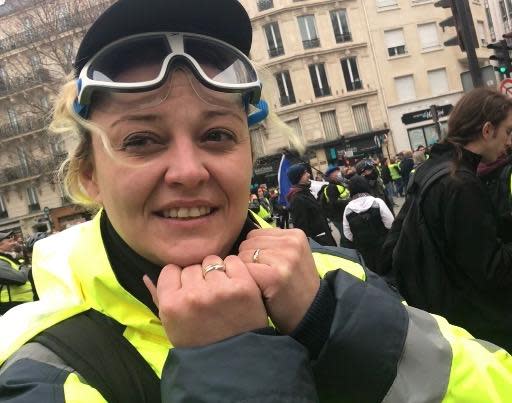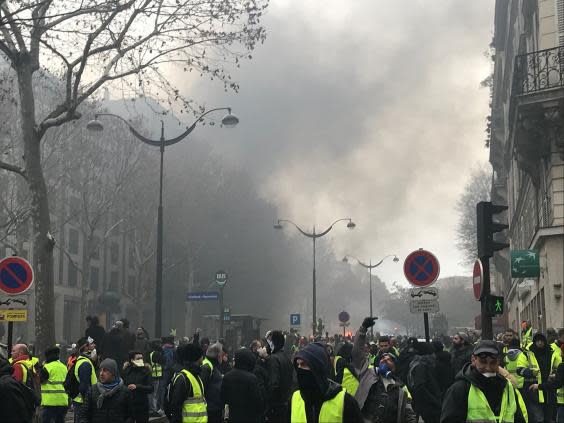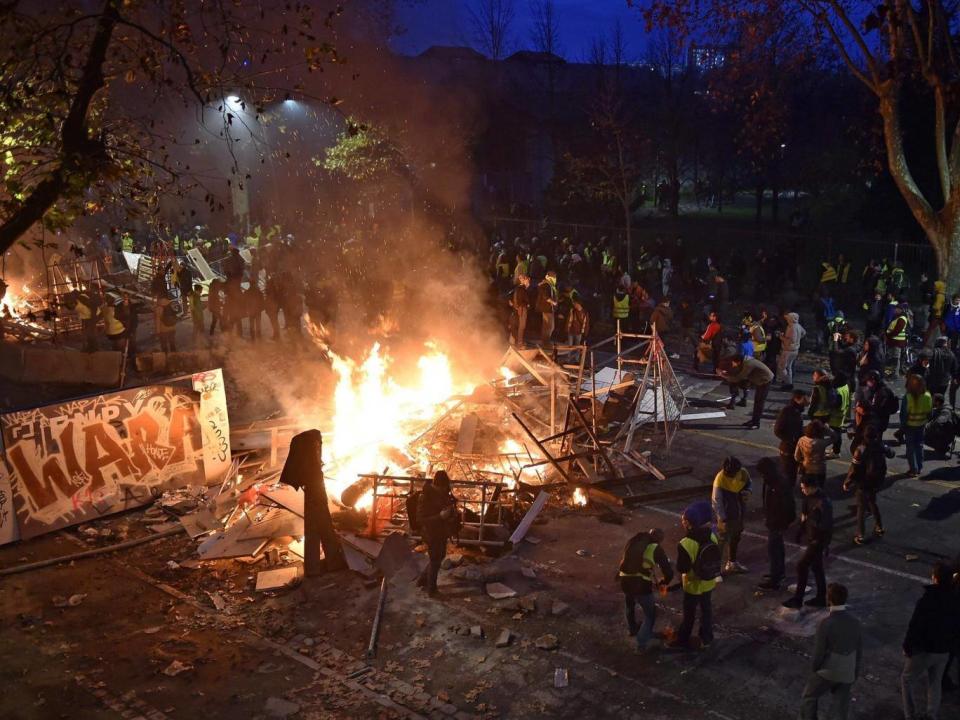France protests: Paris descends into violence as ‘gilets jaunes’ demonstrators say ‘Macron is just part of the rich’
The elegant streets of central Paris were transformed into something like a war zone as anti-government protesters gathered to demonstrate for the fourth consecutive weekend, prompting unprecedented police action.
Parisians and tourists who would usually fill the pavements of the capital remained behind the doors of their apartments and hotels as violence flared, with more than 600 people eventually arrested in the capital alone.
Out on the graffiti-laden, boarded-up streets about 10,000 people from the outer suburbs and elsewhere in the region – who have now come to be known as the “gilets jaunes” – returned, bearing their fluorescent jackets while chanting repeated calls for Emmanuel Macron to resign.
All the shops and restaurants are boarded up. There isn’t a tourist in sight. The protesters appear to have well and truly taken over Paris today #giletsjaunes pic.twitter.com/vAaJj1QOUR
— May Bulman (@maybulman) December 8, 2018
The crowd was mixed, made up of both people bringing their financial grievances to Paris through peaceful protest, and groups of experienced vandals – mainly young men – who tore steadily through some of the city's wealthiest neighbourhoods.
Taking this more forceful approach, a minority of demonstrators set objects alight in the middle of the road, ripped down signs and smashed shop windows. The police, with about a dozen officers on almost every street corner, flanked by rows of vans and in some cases armoured vehicles, were ready to act.
The crack of tear gas canisters was heard throughout the day, and police also used the tactic of “kettling” demonstrators, herding them into a small space and then, in some cases, firing rubber bullets at the crowd.
The Independent spoke to one young protester moments after he was shot in the leg by a rubber bullet and left struggling to walk following a kettling incident. Brandon, 22, had to be treated by medics who were among the protesters.
His friend Romain, 32, said: “The police were advancing in on us and we walked forward a bit, but we didn’t throw stones or anything like that. We were about 50 metres away from them and they shot at him, just like that.”
This 22-year-old has just been shot in the leg with a rubber bullet by police. There are medics among the protesters who are ready to treat injuries like this pic.twitter.com/eWPlfKvf1W
— May Bulman (@maybulman) December 8, 2018
The final major stand-off took place beneath the lights of the Champs Elysees, with a row of six police vans and several dozen officers facing protesters carrying a large banner calling for France to hold an emergency election. The demonstrators eventually dispersed after officers fired tear gas canisters into the crowd.
Not all protesters were rioting. Many said they had come to carry out a peaceful protest against not only the rise in fuel taxes but the cost of living in the country more broadly.
Sandine, a mother-of six living in the suburbs of Paris and working as a school cleaner and dinner lady, said she was “sick and tired” of struggling to keep her head above the financial waters. She claimed that although she had steered clear of rioting, she had still been subject to police brutality.

“I’m not here for the riots. But last week we were here, and even though we weren’t rioting the police were tear-gassing us for the whole day, and in a way I can understand why people do get violent. I think the police response is stronger today,” she said.
Discussing her loss of hope in politicians, Sandine said: “I voted for Macron, but I regret it. I’m anti-Le Pen so I didn’t have a choice. I thought Macron was young and he would do good things, but he’s just part of the rich. Now I wouldn’t vote for anyone.”
Alexis, a 21-year-old construction worker who lives on an estate near Disneyland Paris, and attended the protest with his parents, said: “I can’t live on my salary. If it wasn’t for my parents I would probably be on the street. The government needs to help us. I can’t even afford to take my girlfriend out for dinner. The only meal I can afford to make is pasta.
Alexis, a 21-year-old construction worker from the outskirts of Paris, says: “I am not here to cause a riot, I am not a rioter [...] I just want to be able to live.. To survive” pic.twitter.com/9RafGPKSGQ
— May Bulman (@maybulman) December 8, 2018
“That’s why I’m here. I’m not here to riot, I’m not a rioter. I grew up in an estate but I’m not a rioter. I just want to be able to live, to survive.
“I voted for Macron, and it was a mistake. We were all wrong. Now, we need to do something. He needs to help his people. We should not be treated like animals.”
Another demonstrator, Jean-Loup, a psychologist, said he was joining the protests because “the poor are living in misery while the rich are getting richer”.
He continued: “For a lot of these people it’s about Macron, he’s the target, because he’s the ‘president of the rich’. But for me, it goes beyond Macron, because if we get rid of him it would remain the same. This is about people living in misery.”
Before rejoining the protest, Jean-Loup added: “It’s the same in the UK, no? I think you will see a similar thing there soon.”
Single mother-of-two Sophy, who is currently unemployed, said that even when she has worked her salary was not enough: “I live alone with two children, on a low salary. You can’t live on €1,000 euros a month, it’s not possible. I am forced to battle from the start to the end of the month in order to have enough money to live and feed my children.

“I voted for Macron, and for that I am sorry. It still makes me upset. We believed in him.. But I guess it’s our fault.”
Sophy, who wore goggles on her head in case of tear gas, added: “We tried to do as peaceful a protest as possible, but unfortunately it quickly degenerates into this every time due to certain groups of individuals, which is a shame.
“The important thing for me is that we show on the road that we are here and that we make our calls for change are heard.”

But the protests will probably be remembered less for the pleas from peaceful demonstrators, and more for the violence and hugely tightened security that came alongside them.
They erupted anew despite Mr Macron’s decision to scrap a planned fuel tax rise earlier this week.
France’s interior minister Christophe Castaner said 135 people had been injured during the day, including 17 police officers, and that police had arrested close to 1,000 amid “exceptional” security measures.
The level of violence appeared to be less than that of a week ago, when Paris witnessed its worst unrest since the 1968 student riots, although major clashes also took place in Lyon, Toulouse and Bordeaux.

Edouard Philippe, the prime minister, said police would remain vigilant through the night as some protesters continued to roam Paris.
Groups of young people, many of them wearing masks, continued their skirmishes with police around the Place de la Republique as some shops were looted.

